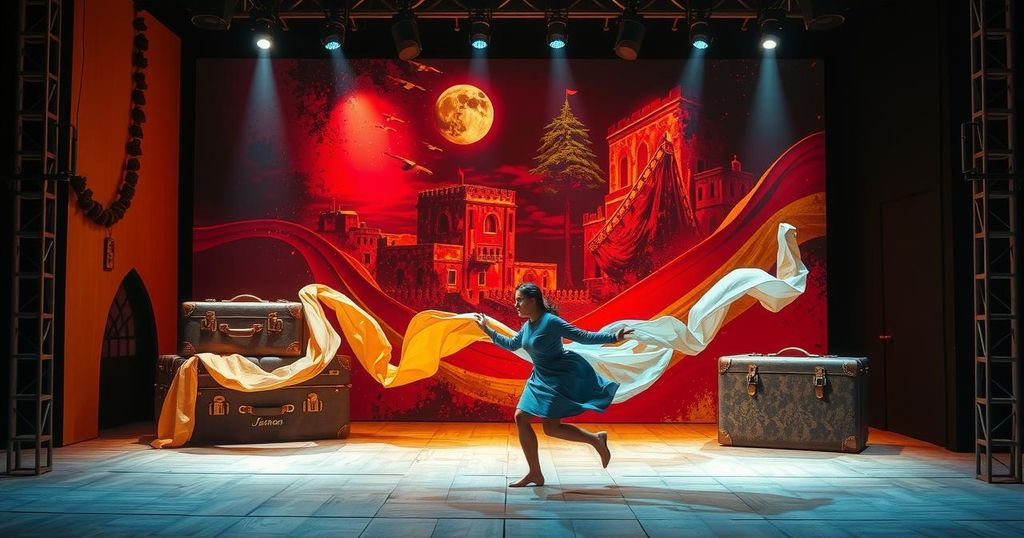Lebanon’s Theaters Reopen Amid Echoes of War and Resilience
Lebanese theaters are witnessing a resurgence as artists like Ali Chahrour and Fatima Bazzi create powerful performances reflecting on the impacts of last year’s war. Chahrour’s “When I Saw the Sea” focuses on the plight of migrant workers, while Bazzi’s “Suffocated” draws from personal displacement. Amidst ongoing economic challenges, these works highlight resilience in the face of adversity.
Beirut, Lebanon – The shadows of war continue to loom over Lebanon, but artists like Ali Chahrour refuse to let conflict extinguish creativity. Chahrour’s latest performance, which speaks to the struggles of migrant workers, emerged from the turmoil of last year’s war. “This project was born during the war,” said the 35-year-old playwright and choreographer. His poignant work is set to premiere in Europe, notably at France’s renowned Avignon Festival.
The piece, titled “When I Saw the Sea,” features two Ethiopian domestic workers alongside a Lebanese Ethiopian woman. Together, they share personal narratives through song, dance, and spoken word, encapsulating the pain inflicted during the two-month conflict between Israel and Hezbollah which concluded in November. This work honors the migrant women who suffered loss and displacement amidst the violence.
Many migrant workers, having been abandoned by employers during the bombardments, found refuge in shelters run by NGOs. Chahrour noted the impact of these women on his work. “Meeting with these women gave me the strength and energy to keep going,” he remarked, highlighting the poor treatment of migrant workers persistently criticized in Lebanon.
Similarly influenced by the devastating war, playwright Fatima Bazzi delivered her own piece, “Suffocated,” in Beirut earlier this May. Bazzi’s narrative was rewritten following her displacement from her home in a war-torn suburb of the city. Originally a story about a woman battling a misogynistic husband, her experience prompted a significant transformation in the narrative.
After fleeing to Iraq until the ceasefire, Bazzi promptly re-engaged with her cast via video calls. “We took advantage of this in the performance… how we worked to continue the play,” she stated while rehearsing. In a striking moment of intertwining fiction and reality, the performance integrates the interruption of a bomb, provoking genuine responses from the characters and resonating with the audience.
For Bazzi, the entire process has transformed into both an escape and a form of therapy, allowing her and her cast to confront and articulate the trauma they have collectively endured. Theater spaces across Lebanon are reopening; however, they do so under the weight of a persistent economic crisis that has afflicted the country since 2019.
Omar Abi Azar, founder of the Zoukak collective, expressed the struggles faced by local theatres. “We postponed an entire festival at the end of last year due to the war,” he said, although he affirmed that they have begun to regain their momentum. His play, “Stop Calling Beirut,” is a reflection of loss and memories from his childhood during Lebanon’s civil war, one that lingers in the fabric of society today.
Zoukak itself arose during a previous conflict in 2006, reminding us that the very act of making art can be a response to trauma and uncertainty. “We are children of war,” Abi Azar underscored. In his perspective, the hardships they face aren’t merely obstacles but an ingrained reality that cannot suppress creativity. “If this reality wanted to pull us down, it would have dragged us, buried us, and killed us a long time ago,” he asserted, finding solace and strength in their artistic endeavors.
In Lebanon, the fallout from last year’s war continues to inspire creators as they dive into storytelling that reflects their profound experiences of conflict and resilience. Ali Chahrour and Fatima Bazzi, among others, craft performances that not only illuminate the struggles of migrant workers but also express their own personal traumas. While local theaters aim to bounce back from both the war and ongoing economic strife, these artists remain committed to their pieces, proving that, despite the weight of reality, creativity endures.
Original Source: www.france24.com




Post Comment